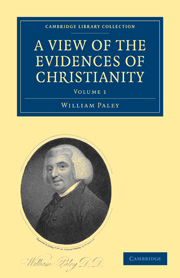Book contents
- Frontmatter
- HONOURABLE AND RIGHT REVEREN
- PREPARATORY CONSIDERATIONS
- PART I OF THE DIRECT HISTORICAL EVIDENCE OF CHRISTIANITY, AND WHEREIN IT IS DISTINGUISHED FROM THE EVIDENCE ALLEGED FOR OTHER MIRACLES
- CHAPTER I
- CHAPTER II
- CHAPTER III
- CHAPTER IV
- CHAPTER V
- CHAPTER VI
- CHAPTER VII
- CHAPTER VIII
- CHAPTER IX
- SECTION I
- SECTION II
- SECTION III
- SECTION IV
- SECTION V
- SECTION VI
- SECTION VII
- SECTION VIII
- SECTION IX
- SECTION X
- SECTION XI
- CHAPTER X
- CHAPTER I
- Frontmatter
- HONOURABLE AND RIGHT REVEREN
- PREPARATORY CONSIDERATIONS
- PART I OF THE DIRECT HISTORICAL EVIDENCE OF CHRISTIANITY, AND WHEREIN IT IS DISTINGUISHED FROM THE EVIDENCE ALLEGED FOR OTHER MIRACLES
- CHAPTER I
- CHAPTER II
- CHAPTER III
- CHAPTER IV
- CHAPTER V
- CHAPTER VI
- CHAPTER VII
- CHAPTER VIII
- CHAPTER IX
- SECTION I
- SECTION II
- SECTION III
- SECTION IV
- SECTION V
- SECTION VI
- SECTION VII
- SECTION VIII
- SECTION IX
- SECTION X
- SECTION XI
- CHAPTER X
- CHAPTER I
Summary
But they, with whom we argue, have undoubtedly a right to select their own examples. The instances with which Mr. Hume has chosen to confront the miracles of the New Testament, and which, therefore, we are entitled to regard as the strongest which the history of the world could supply to the inquiries of a very acute and learned adversary, are the three following:
I. The cure of a blind and of a lame man of Alexandria, by the emperor Vespasian, as related by Tacitus;
II. The restoration of the limb of an attendant in a Spanish church, as told by cardinal de Retz; and,
III. The cures said to be performed at the tomb of the abbé Paris, in the early part of the present century.
I. The narrative of Tacitus is delivered in these terms; “One of the common people of Alexandria, known to be diseased in his eyes, by the admonition of the god Serapis, whom that superstitious nation worship above all other gods, prostrated himself before the emperor, earnestly imploring from him a remedy for his blindness, and entreating that he would deign to anoint with his spittle his cheeks and the balls of his eyes. Another, diseased in his hand, requested, by the admonition of the same god, that he might be touched by the foot of the emperor. Vespasian at first derided and despised their application; afterwards, when they continued to urge their petitions, he sometimes appeared to dread the imputation of vanity; at other times, by the earnest supplication of the patients, and the persuasion of his flatterers, to be induced to hope for success.
- Type
- Chapter
- Information
- A View of the Evidences of ChristianityIn Three Parts, pp. 349 - 362Publisher: Cambridge University PressPrint publication year: 2009First published in: 1794

